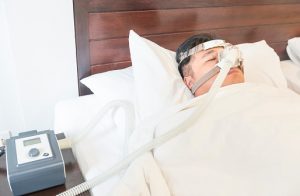 Sleep apnea positive airway pressure (PAP) treatment in heart failure patients reduced hospital readmission and emergency room visits. First author Dr. Sunil Sharma said, “Our research showed that early recognition and treatment of patients hospitalized with decompensated congestive heart failure is associated with a reduction in readmissions, for patients who use their positive airway pressure (PAP) therapy on a regular basis. Importantly, hospitals can implement cost-effective screening programs to catch sleep apnea in hospitalized, high-risk patients.”
Sleep apnea positive airway pressure (PAP) treatment in heart failure patients reduced hospital readmission and emergency room visits. First author Dr. Sunil Sharma said, “Our research showed that early recognition and treatment of patients hospitalized with decompensated congestive heart failure is associated with a reduction in readmissions, for patients who use their positive airway pressure (PAP) therapy on a regular basis. Importantly, hospitals can implement cost-effective screening programs to catch sleep apnea in hospitalized, high-risk patients.”
The researchers screened heart failure patients admitted to the hospital for any underlying sleep problems. Of the 75 patients, 70 received a diagnosis of sleep disordered breathing. Then, over the course of six months, the researchers tracked patients’ compliance to PAP treatment, emergency room visits, and readmission rates.
Advertisement
The researchers found that those who used PAP treatment regularly had a reduction in hospital visits over the course of six months.
Dr. Sharma concluded, “Physicians should be on the lookout for sleep apnea in patients with heart failure with the goal of diagnosing and treating early, which might help prevent readmissions and emergency room visits. Multi-center, randomized studies are needed to replicate and validate these findings.”
Predict obstructive sleep apnea early by simple test in hospitalized heart failure patients
Researchers at Thomas Jefferson University have found a way to predict obstructive sleep apnea early on in heart failure patients with a simple test. The test involves a questionnaire, evaluation, and pulse-oximetry monitoring. Lead author Dr. Sunil Sharma said, “Since traditional screenings are not always effective in patients with congestive heart failure, additional tools are needed. Our team was able to validate a screening strategy that can be instituted during hospitalization and effectively detect sleep disordered breathing among patients with congestive heart failure.”
Dr. Sharma continued, “While an estimated 70 percent of patients with congestive heart failure have underlying sleep disordered breathing, only a minority, roughly two percent, are diagnosed and treated. Yet, early recognition and treatment of this disorder in patients with congestive heart failure has been shown to improve ejection fraction, acute heart failure, and may even reduce readmissions and mortality.”
Patients admitted to the hospital with heart failure were screened by respiratory therapists using STOP-BANG Questionnaire (Snoring, Tiredness during daytime, Observed apnea, high blood Pressure – Body mass index greater than 35, Age greater than 50 years, Neck circumference greater than 40 centimeters, and Male gender).
Advertisement
If the patients screened positive, they were given a formal sleep consult during their hospital stay and underwent high resolution pulse-oximetry testing, which measures oxygen in a person’s blood. Patients with a high oxygen desaturation index (ODI) were then recommended to an overnight polysomnography where individuals were diagnosed with sleep apnea.
Dr. Paul J. Mather, Director of the Advanced Heart Failure and Cardiac Transplant Center at the Jefferson Heart Institute, added, “Patients with congestive heart failure do not always present with traditional symptoms of sleep apnea, like daytime sleepiness and heavy snoring. This study presents cardiologists with a cost-effective clinical pathway to detect sleep disordered breathing while these patients are hospitalized.”
Senior author Dr. David J. Whellan said, “Our team’s research showed that overnight pulse-oximetry, a simple low-cost device used in the hospital setting, correlates well with the gold-standard polysomnography. Future research is needed to see if early screening and intervention of sleep disorder breathing, specifically obstructive sleep apnea, can reduce readmissions, morbidity, and mortality in patients with congestive heart failure.”
